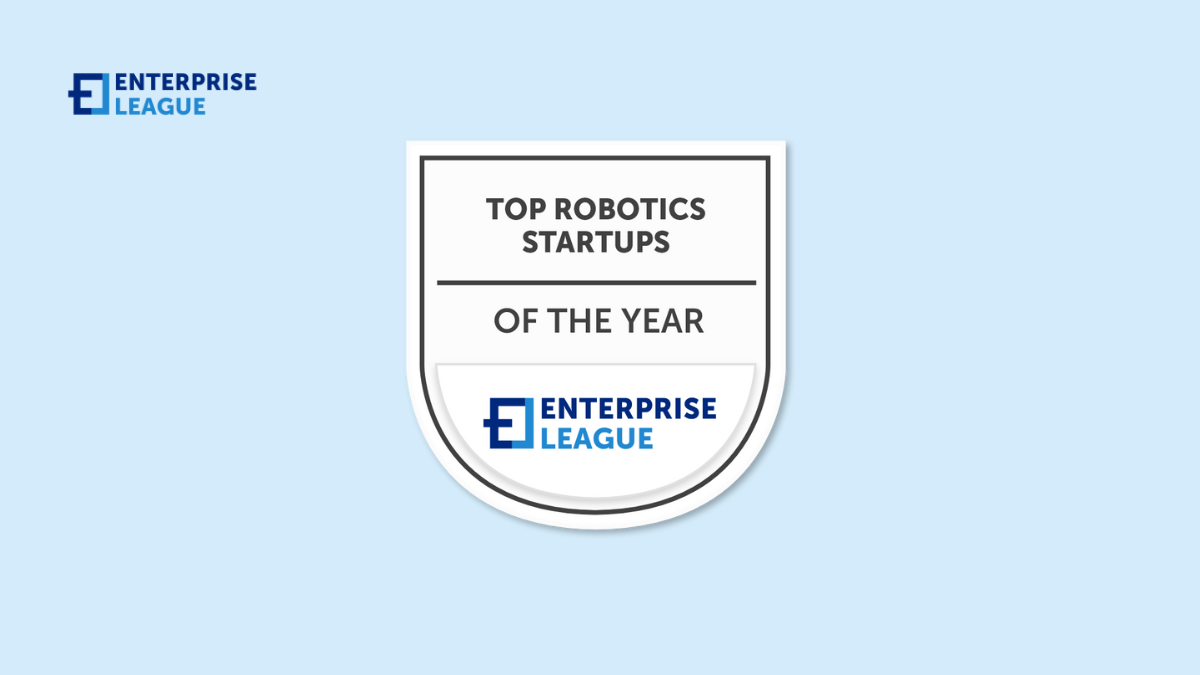Robotics is advancing so rapidly that predicting what’s coming next is hard. As costs have come down and technology has advanced, entrepreneurs have realized the vast potential for robotics to revolutionize everything from healthcare to agriculture. The global industrial robotics market size is expected to reach USD 60.56 billion by 2030. These predictions lead to an explosion of robotics startups aiming to bring innovative robotic solutions.
Top robotics startups
Complete list of 21 robotics startups that are worth knowing:
Anduril
Founded in 2017, Anduril builds artificial intelligence (AI) platforms that analyze data to aid disaster response, border security, military operations, and more. For example, Anduril has AI camera systems with computer vision that can automatically detect wildfires early and alert first responders faster so less area burns. Their autonomous drones fly over borders and seaports to identify suspicious activity and track the situation.
Anduril is even testing AI-powered sentry towers at military bases that use sensors and analytics to improve perimeter surveillance. Anduril develops advanced systems using automation, machine learning, and neural networks so that tasks like flood monitoring, damage assessment, and intruder tracking can happen accurately and efficiently. By teaching AI to handle huge amounts of sensor and imaging data, Anduril systems operate tirelessly without human operators.
Voliro
Founded in 2018, Voliro offers a fleet of purpose-built drones equipped with sensors and cameras optimized for mapping, surveying, inspection and monitoring applications. Cloud-based software converts the aerial data into actionable insights.
By developing drone technology focused on construction challenges, Voliro unlocks new productivity and safety capabilities previously infeasible. Their drones efficiently cover infrastructure sites too dangerous or remote for manual inspection.
Harvest Automation
Founded in 2012, Harvest offers robotic systems for repetitive transportation and organization tasks traditionally performed manually. Applications span conveyance, spacing, and arrangement of potted plants, containers, and inventory items.
By providing purpose-built robots, Harvest unlocks major labor cost and productivity improvements for businesses reliant on less efficient, injury-prone manual work. Their automation solutions enable scalability and ergonomic benefits.
Sphero
Founded in 2010, Sphero offers interactive bots, coding apps, and modular accessories that bring hands-on programming and problem-solving directly to the classroom or home. Learners develop computational thinking as they customize and control their unique bot creations.
By making coding physical and collaborative, Sphero aims to make computer science approachable and fun. Their bots let students see their programs come to life while developing valuable technical and cognitive abilities.
Modular Robotics
Founded in 2009, Modular Robotics designs engageable robot block sets that teach coding, critical thinking, and problem solving through play. Learners construct bots by snapping together interactive sensor, actuator, and logic blocks.
By making robotics tactile and intuitive, Modular aims to get learners actively exploring fundamental concepts. Students grasp systems thinking as they create bots capable of drawing, dancing, avoiding obstacles, and more based on how they combine the blocks.
Boston Dynamics
Founded in 1992, Boston Dynamics develops iconic humanoid and quadrupedal robots like Atlas, Spot, and Handle that handle terrain once thought too challenging for machines. Their advances sit at the leading edge of robot locomotion, manipulation, and cognition.
By constantly pushing limits, Boston Dynamics expands possibilities for real-world automation and human-robot collaboration. Their foundational contributions unlock emerging applications across safety-critical domains and hazard mitigation.
Company Six
Founded in 2017, Company Six created a carbon fiber drone optimized for portability, flight time, and surveillance capability across challenging terrain. The UAV features swappable LTE, night vision, and EO/IR cameras.
Built to military standards, the drone delivers unmatched monitoring and data for field personnel. By packing robust intelligence gathering into a portable platform, Company Six enables more informed strategic action from the air.
Rapid Robotics
Founded in 2020, Rapid Robotics developed lightweight, flexible robots that attach to existing equipment to handle mundane chores like parts loading/unloading and inspection. Human workers can then focus on more engaging, higher-value responsibilities.
By providing accessible automation, Rapid enables incremental productivity gains without overhauling workflows. Workers of varying skill levels can deploy their adaptive robots based on evolving needs.
Vecna Robotics
Founded in 1998, Vecna created AI-driven robotics that use computer vision and deep learning to refine capabilities based on daily operation. By continuously assimilating knowledge, their robots grow smarter at traversing changing environments and handling new tasks.
As on-site needs evolve, Vecna’s robots retain more institutional know-how to take on emerging roles. By combining autonomy with open-ended learning, their technology is poised to drive greater efficiency as automation scales up.
Learnosity
Founded in 2010, Learnosity provides a cloud-based solution to build, customize, conduct, and gain insights from tests, exams, surveys, and other instruments. Authors can develop items, build adaptive tests, and apply latest accessibility standards with ease.
By centralizing and modernizing assessment workflows, Learnosity enables creators to focus on quality content while improving outcomes through impactful measurement. For organizations managing complex testing needs at scale, Learnosity delivers a comprehensive platform built for the unique rigor and vision of today’s evaluators.
Time is Ltd.
Founded in 2014, Time is developed enterprise knowledge graphing technology that constructs models of how employees interact through metrics like email, meetings, and shared goals. The resulting maps quantify cooperation, gaps, and opportunities.
By making collaboration visible, Time is aims to help companies improve information flows and productivity through data-driven insights. Their analytics uncover strengths and bottlenecks within and across the organization.
TELEXISTENCE Inc.
Founded in 2020, TELEXISTENCE created humanoid robots controlled remotely using VR interfaces that provide operators with immersive sensory feedback. This allows seamless remote manipulation suitable for delicate tasks.
By enabling new possibilities for human-robot synergy, TELEXISTENCE unlocks options to safely expand human skills and perception into hazardous or distant locations. Their solutions offer more flexibility than autonomous-only alternatives.
Clearpath Robotics
Founded in 2009, Clearpath offers configurable autonomous mobile robots tailored for prototyping and scaled deployment. Research teams can collect data, test concepts, and validate designs using their flexible platforms.
Industries leverage Clearpath’s tested hardware and software components to jumpstart in-house development. By supporting innovators across segments, Clearpath enables greater collective progress on autonomous systems.
Preferred Networks
Founded in 2014, Preferred Networks engineering teams research and productize technology like deep reinforcement learning, edge computing, autonomous driving, and manufacturing AI solutions. Their work bridges academic investigation and industry needs.
By closing the gap between leading research and usable implementations, Preferred Networks pushes the boundaries of what applied AI can achieve. Their contributions unlock new functions across automation, mobility, IoT and more.
Thentia
Founded in 2004, Thentia created a low-code platform for automating policy management, integrated data sharing, regulatory reporting, and oversight collaboration. Complex organizations gain speed, visibility, and new capabilities.
By providingpurpose-built solutions, Thentia helps regulated entities unlock innovation opportunities previously constrained by dated technology. Their software optimizes compliance operations enterprise-wide.
Xiaoduo
Founded in 2016, Xiaoduo engineered personable robots integrating computer vision, machine learning, verbal interaction capabilities, and localized mapping to handle retail, events, banks, airports, and other busy venues.
By enabling service automation in uncontrolled real-world settings, Xiaoduo unlocks new possibilities for applied commercial robotics. Their innovations open valuable use cases across industries impacted by labor challenges.
Rapyuta Robotics
Founded in 2014, Rapyuta created an integrated hardware-software platform optimizing collaborative industrial robots. Teams can deploy, adapt, and grow their robotic workforce dynamically through Rapyuta’s robust cloud automation framework.
By providing an agile robotics-as-a-service solution, Rapyuta unlocks scalable automation without overhauling workflows. Their technology brings access to automation capabilities once only afforded by major capital investments.
Synaptive Medical
Founded in 2012, Synaptive creates integrated hardware and software solutions covering surgical imaging, visualization, navigation, and automation. Their Modus VTM platform improves visualization of patient anatomy during complex minimally invasive procedures.
By providing enhanced surgical tools, Synaptive helps clinical teams reduce risks and extend capabilities. Their technologies enable previously infeasible minimally invasive techniques.
Sobot
Founded in 2015, Sobot developed a no-code platform empowering teams to easily build chatbots that understand natural language and conversations. Bots access knowledge bases to handle common inquiries while routing complex issues to appropriate agents.
By enabling automated self-service alongside human assistance, Sobot helps companies provide efficient, personalized support through the right channel. For businesses looking to upgrade customer experience, Sobot delivers an intuitive way to implement cooperative AI.
AIQI Technology
Founded in 2016, AIQI develops proprietary algorithms, sensors, actuators, and software to power next-generation intelligent robots and complex autonomous systems. The team publishes research to push boundaries while commercializing platforms.
By bridging cutting-edge investigation with real-world problem solving, AIQI expands possibilities for applied AI and automation. Their contributions enable emerging capabilities in manufacturing, service robots, driverless cars, and other areas.
ROOBO
Founded in 2014, ROOBO engineers interactive social robots integrating computer vision, voice recognition, conversational AI, and humanoid design. Domgy acts as an intelligent home manager while Eemoo teaches through interactive storytelling and games.
By combining hardware and software innovations tailored for family utility, ROOBO aims to enhance home life through friendly, helpful robot companions. As consumer expectations evolve, their innovations move the market towards more advanced, useful, and accessible assistance robots.
Conclusion
By daring to think differently, these robotics startups are focused on developing robotic technologies and bringing innovative robotics products to market. The future remains uncertain, but with innovators like these at the helm, the potential seems boundless.
Discover more creative startups that might interest you:
- Successful pest control startups driving innovation with green products and digital tools.
- Must-know blockchain startups revolutionizing the industry.
- Entertainment startups that are using tech to change the entertainment industry.
- Mind-blowing retail solutions by the world’s most ambitious retail startups.
- Revolutionary biotech startups helping the world with amazing innovations.
Related Articles
10 business tips for beginners to help you build a healthy brand
Starting a business can be quite the challenge especially if you’re all new to entrepreneurship. These business tips for beginners will help you set off on the right foot.
SEO writing: Five foolproof tips to secure you the first page
When it comes to SEO writing it’s more guessing and less evidence about what works and what doesn’t. Luckily, we know what can really help you reach the first page.
How to onboard a new employee: Tips for quick integration
Your guide to smoother employee onboarding where you will find practical strategies that help new hires feel welcome and become productive team members faster.
10 business tips for beginners to help you build a healthy brand
Starting a business can be quite the challenge especially if you’re all new to entrepreneurship. These business tips for beginners will help you set off on the right foot.
SEO writing: Five foolproof tips to secure you the first page
When it comes to SEO writing it’s more guessing and less evidence about what works and what doesn’t. Luckily, we know what can really help you reach the first page.








